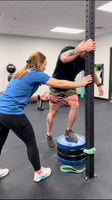Are you looking for a way to alleviate muscle pain, enhance your mobility, and accelerate your...
Recovery Strategies for High-Intensity Training: What Works Best?
High-intensity workouts are meant to push limits. Whether it's interval training, CrossFit, or strength-based circuits, these sessions place significant stress on the muscles, joints, and nervous system. But the real gains don’t happen during the workout—they happen after, when your body repairs and rebuilds.
READ: Building Explosive Power: Strength & Conditioning Tips from Experts
Without proper recovery, your system doesn’t have time to adapt. This can lead to fatigue, stalled progress, and eventually injury. Inconsistent energy, lingering soreness, and repeated aches are signs that your body is overreaching—and under-recovering.
 Recovery isn’t a luxury—it’s a core component of smart training. It’s what allows high-intensity work to be sustainable, not just impressive.
Recovery isn’t a luxury—it’s a core component of smart training. It’s what allows high-intensity work to be sustainable, not just impressive.
At Elevation Athletics, we work with athletes in Fort Worth to make recovery an active, intentional part of every training plan—not an afterthought.
Signs You’re Not Recovering Well
It’s easy to overlook recovery—until your body forces the issue. When you’re not recovering properly from high-intensity training, the signs start to stack up. Some are subtle, while others can derail your progress altogether.
Here are common red flags to watch for:
- Lingering Muscle Soreness
It's normal to feel sore after a hard session, but if that soreness persists for days or intensifies with each workout, your recovery may be lacking. - Fatigue That Won’t Go Away
Feeling tired is one thing—feeling drained before you even start your workout is another. Constant fatigue often means your system hasn’t bounced back. - Performance Plateaus or Declines
If your strength, speed, or endurance starts slipping despite consistent training, poor recovery could be the culprit. - Poor Sleep and Mood Swings
Overtraining affects your nervous system, which can disrupt sleep, focus, and overall mood. - Recurring Aches or Minor Injuries
Small pains that won’t go away are often early indicators that your body needs more support between sessions.
Recovery is your body’s feedback loop. If these signs are showing up, it’s time to reassess how you’re taking care of yourself between workouts.
READ: Beyond ACL Surgery: How Keller Athletes Build Long-Term Knee Stability
The Best Recovery Strategies Backed by Results
Not all recovery is created equal. To keep your body performing at its best, your strategy needs to be intentional, consistent, and matched to the demands of high-intensity training. Here’s what works:
- Active Recovery and Mobility Work
Gentle movement—like walking, cycling, or mobility drills—helps flush out waste products, reduce soreness, and restore normal movement patterns. It’s especially important after intense lifting or metabolic conditioning workouts. - Prioritize Sleep and Hydration
Sleep is when your body does the heavy lifting of repair. Aim for 7–9 hours each night, and stay well-hydrated throughout the day to support tissue health and joint lubrication. - Dial In Nutrition Timing
Consuming a mix of protein and carbohydrates within 30–60 minutes post-workout jumpstarts muscle repair and replenishes glycogen stores. Don’t wait too long—refueling matters. - Manual Therapy and Physical Therapy
Hands-on techniques can target soft tissue restrictions and promote circulation. At Elevation Athletics, our physical therapy team uses movement-based recovery to address tightness, pain, and imbalance. - Holistic Wellness Support
Our wellness services include individualized mobility work, recovery education, and proactive movement screens to ensure your body can handle the demands of training. These sessions help you feel better between workouts so you can train harder during them.
The best recovery strategy is the one that matches your body’s needs and your training goals—and sticks with you for the long run.
Recovery Support in Fort Worth
If you’re training hard, your recovery needs to match that intensity. At Elevation Athletics in Fort Worth, we help athletes and active adults build recovery into their routine—intentionally, consistently, and with purpose.
READ: Keller Athlete’s Guide to ACL Prevention: PT Strategies for Every Sport
Whether you're dealing with nagging soreness, looking to improve performance, or want to avoid burnout, our team offers expert support through physical therapy and personalized wellness services. From manual therapy and mobility work to movement screens and recovery coaching, we help you get the most out of your workouts—without the wear and tear.
Ready to feel better between sessions and perform better during them? Schedule your recovery consultation today and take the next step in your high-intensity training journey.
%20(1).png?width=500&height=128&name=Elevation%20Atletics%20(3)%20(1).png)


